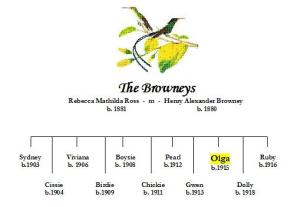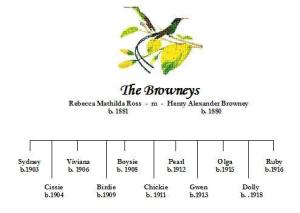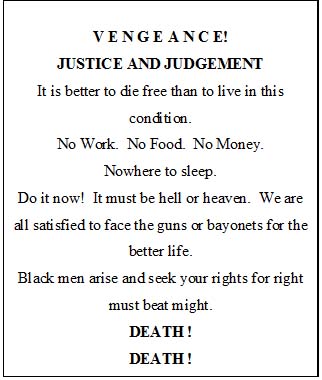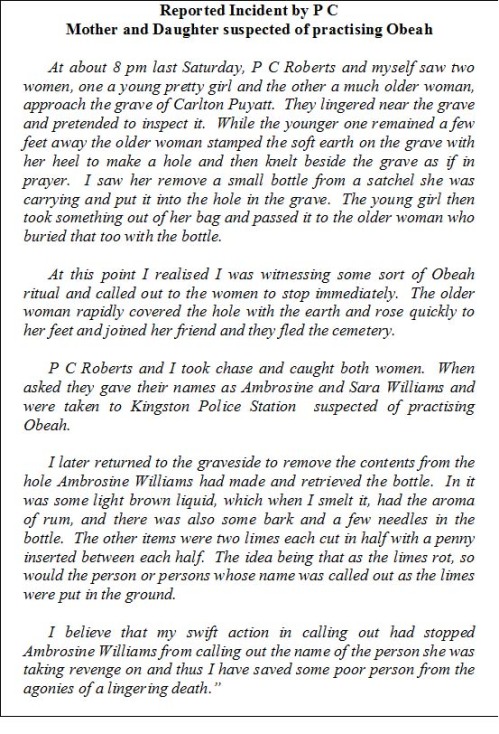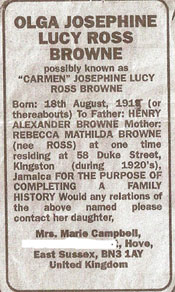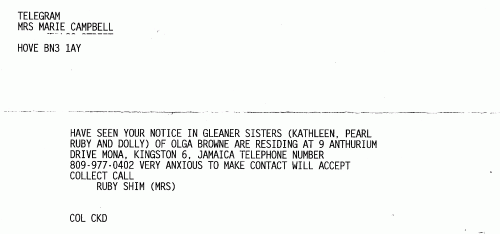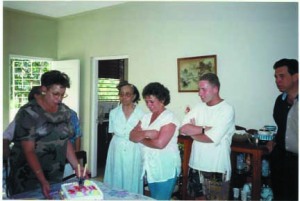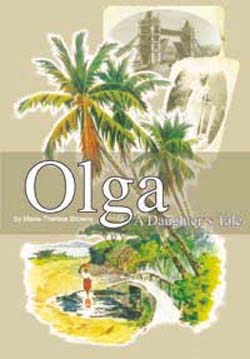Olga’s Diary (Continued)
Daily Gleaner, Kingston
29th December 1953
OBITUARY
Rebecca Mathilda Browney
******
Letter to Mrs Rebecca Browney, Jamaica
from
Miss Geraldine Franks, Superintendent, Catholic Refuge for Friendless Girls,
23 Barclay Road, Fulham,London.
Dear Mrs Browney
It is with great concern I write to you regarding your daughter Olga as I do not believe you are aware of her circumstances.
I first became acquainted with your daughter when she was referred to this home by the Matron of St Giles Hospital because she was pregnant. Olga remained at the Refuge until she gave birth to her daughter, Marie.
It is part of the Refuge’s policy that we try and maintain contact with mothers in order to see how they cope with their baby and, in spite of my initial doubts as to Olga’s ability to support both herself and a baby in a foreign country, as an unmarried mother and the stigma associated with that, I was impressed with how well she managed.
However, Olga’s circumstances have now changed and she recently came to me with Marie in some emotional and financial distress. Her appearance gave me cause for concern, although, I would report that Marie looked well nourished and cared for. I gave her a little money, but, I suspect that Olga has no job or even a home to go to since she was evasive when I asked where she was living.
I did my best to try and persuade Olga to contact you but, she is as adamant, as she was when I first met her, that you should know nothing of her circumstances. I have respected her decision until now.
I believe your son Sydney comes to London on business. I would urge that on his next visit he contacts me and I will endeavour to help him locate Olga and Marie.
Yours truly
Miss Geraldine Franks (Superintendent)
******
Lucy’s Diary
Over the years Martha has been referred to as the black sheep of the family, but my sister has demonstrated that she is much more than that. She is a vengeful and wicked woman who broke the heart of a sister that had only ever shown her kindness and affection.
I realise now the dye was cast for Becky all those years ago when she announced her plans to marry Henry. Martha thought, irrationally, her dream of becoming rich with her own fashion house had disappeared because of Becky’s decision to marry a black man. Of course, she was wrong. She could have continued with her plans and ridden out the storm. But she lacked courage, something Becky had in abundance. So as an act of spite for some perceived slight all those years ago, Martha finally got her revenge in a spectacularly cruel way, allowing Becky to go to her grave believing her beloved daughter was dead. How could she do that?
As for Martha’s hypocrisy, lambasting Becky for marrying a black man when she was secretly living in sin with one in London, I cannot even bring myself to comment on it.
Thank God for Geraldine Franks. What a good woman she is, but if only she had contacted us sooner. Olga is alive and has a little girl. Sydney says he will go to London to find her and bring them home.
******
How The Tale Ends
50 Years Later
My mother, Olga, never returned to Jamaica nor was she reunited with any member of her family again after her meeting with Sydney in 1946. Over the years Mum had been reluctant to talk about her past so I determined to find out what I could myself. I placed the following advertisement in the Sunday Gleaner in July 1996:
******
And then two days later we received the following telegram.
Telegram from Mrs Ruby Shim (nee Browney), Kingston, Jamaica to
Mrs Marie Campbell, Hove, East Sussex, UK.
HAVE SEEN YOUR NOTICE IN THE GLEANER. SISTERS (CISSIE, PEARL, RUBY AND DOLLY) OF OLGA BROWNEY ARE RESIDING AT 9 ANTHURIUM DRIVE, MONA, KINGSTON 6, JAMAICA. TEL: NO: 809-XXX-XXX. VERY ANXIOUS TO MAKE CONTACT. WILL ACCEPT COLLECT CALL. RUBY SHIM (MRS)
******
Within a day of receiving the telegram I made the phone call and for the first time in over 50 years Mum spoke to her sisters Ruby, Dolly, Chickie and Pearl. Ruby told Mum that Mammie, Pops, Sydney, Vivie, Cissie and Gwennie had all died, but the others were still alive.
She said Sydney came looking for Mum twice in the 1950s, but he said she’d vanished without trace.
Slowly my mother’s story unravelled and I discovered much about her family and other things too; I learnt about my grandmother and what courage she showed in following her heart and marrying a black man knowing she would be ostracised by Jamaican white and coloured society; I learnt how the Jamaican social and class structure mirrored the English pattern of behaviour. I knew there was colour prejudice (or racism as it is called today) but I had no idea that coloured people felt the same way about the blacks. I was upset to hear that some of my grandmother’s children railed against Becky for marrying a black man.
I learnt a lot about the wonderful Jamaican culture and folklore – anancy, duppies and, of course, obeah, things I knew nothing about until I started my research. A couple of times, when I was a child Mum had mentioned, almost sheepishly, that her mother and other members of her family practiced voodoo in Jamaica and that it was a powerful weapon to extract revenge for wrongs committed.
My Aunt Ruby told me when I met the family in Kingston, that my great aunt Martha narrowly escaped being buried in a pauper’s grave in London thanks to the generosity of the family responding to a request from a Catholic priest for money to bury her.
But the most notable information I acquired was how I was conceived. It was obvious as Mum told me her story that the anguish of that event had barely diminished even though it had happened decades ago.
When, over the years, Mum refused to talk to me about my father saying “it’s too painful” it never once crossed my mind that she might have been raped and I was the result. I can only imagine what it must have been like for her – an unmarried mother, coloured, no family for support – save for a malevolent alcoholic aunt and alone in a foreign country which just happened to be in the middle of a world war.
My father died in New York in December 1949; waiting on a railway platform he fell under the wheels of an oncoming train and was killed instantly. By all accounts he was a man with a complex personality, mercurial and prone to depression. He suffered from mood swings, failing eyesight and dizzy spells, the latter caused by a serious horse riding accident a few years before his death. Opinion was divided as to the cause of his death. The medical examiner recorded John Edward’s death as ‘probably an accident’ since an autopsy had shown nothing untoward. His family thought it was an accident; his work colleagues thought he’d committed suicide as a result of his depression.
As for how I feel about my father, I take my cue from Mum whom I never heard voice any bitterness about what happened to her.
I wrote this book because I wanted future generations of my family to know something of their heritage and also out of respect to my mother, a gentle and remarkable woman who had huge moral courage.
If the maxim is true, that daughters eventually become like their mother then all I can say is… lucky me. Marie Campbell
If you enjoyed this post, please consider letting your friends know or leave a comment or subscribing to the feed to have future articles delivered to your feed reader.
